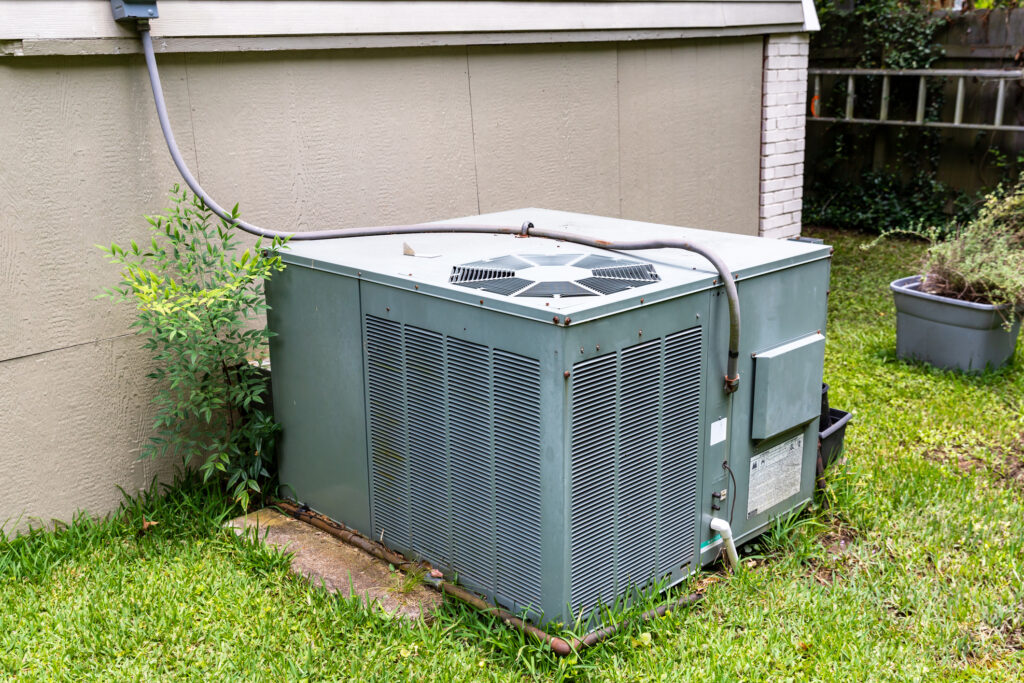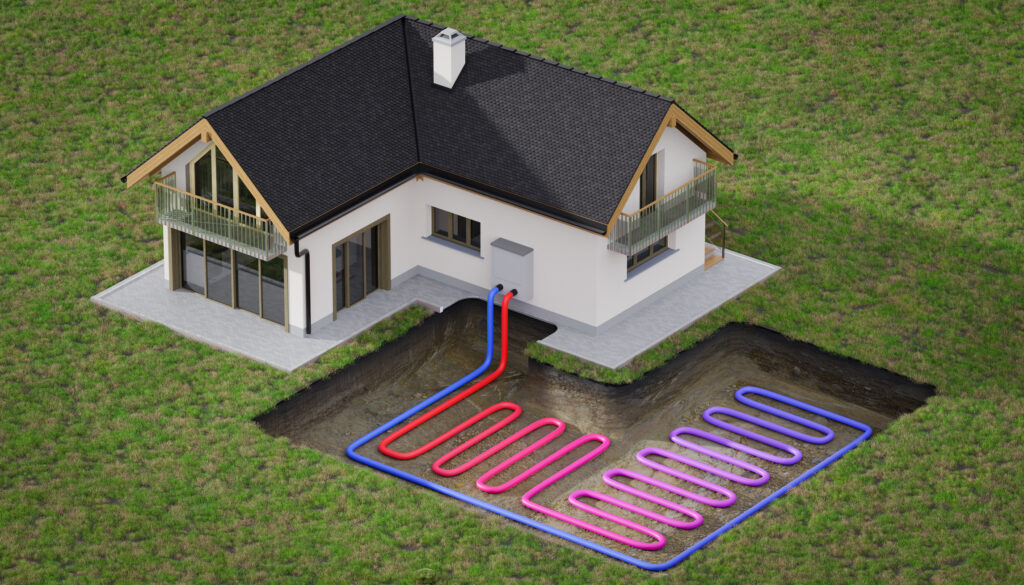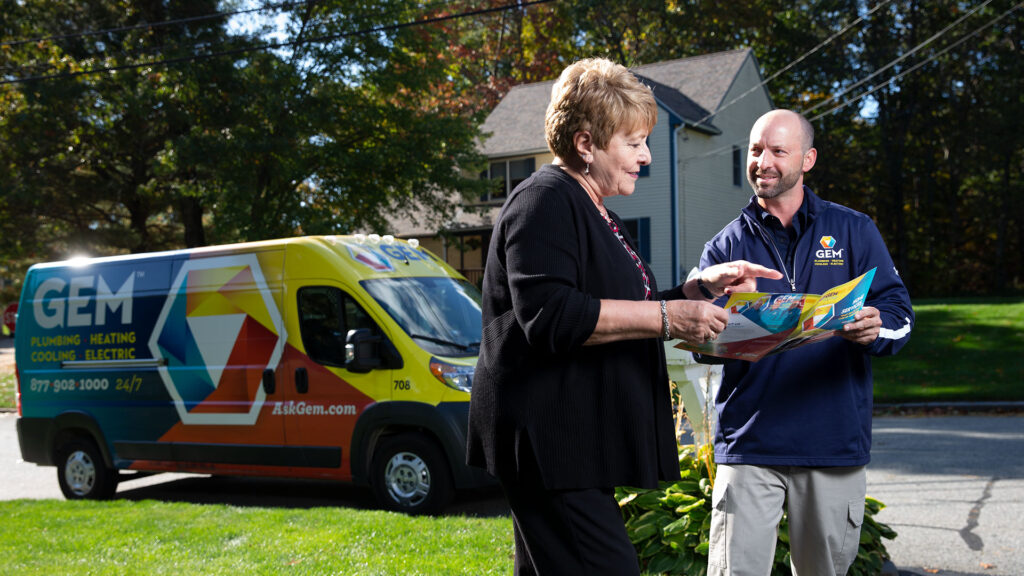So, your old heating system has died, and you need to decide on a new one. Change is hard, we get it. We are here to make it as easy on you as we can.
Questions start piling up: Should you get a similar system as the previous one? Is there a more efficient option? Which option is best for your house? Should you upgrade early to reduce your energy usage? Are there rebates available for greener options?
Let the experts at GEM help you find the right system for your home.
So, what’s the best heating system for you?
It all depends on things like your:
- House
- Climate
- Lifestyle
You don’t need to replace your heating system with the same thing that you had. There are so many other options out there to consider, too! Take a look at the list below for some information.
Decide On A Fuel Type
First, you should consider what type of fuel makes the most sense for your HVAC system.
- Gas or Propane: A heating system powered by natural gas or propane offers convenient, affordable, safe, and reliable heat. Because these systems use the gas provided by your utilities, you don’t have to worry about getting a fuel delivery.
- Oil: Oil-powered heating systems produce the hottest flame of any home heating fuel, which means they use less fuel to heat your home faster and keep it at the temperature you want. Because oil systems produce odor if they malfunction, you are less likely to be caught off-guard by a carbon monoxide leak.
- Electric: Electric systems absorb heat or cold from the ground around your home, amplify it, and then transfer that heat or cool into your home. Electric systems can produce up to four times more energy than they consume, so they are typically 30-40 percent more efficient than gas-powered systems. And because electric systems do not rely on internal combustion, there is no chance of a carbon monoxide leak or fire. Electric systems are totally clean and very efficient, but may cause a spike in your electricity bills. Our electricians can inspect your homes electrical system and recommend energy saving solutions.
If you’re feeling conflicted over your top 2 choices (we know, it’s really hard to choose), ask your home services contractor what kind of heating system will be right for your home.
And now (drumroll please…)
Your Heating System Options
Variable Speed Motors
Advances in electronically commutated motors and gas controls have led to the creation of gas furnaces that operate at multiple stages.
Cool right?!
What this really means is that as the motor acts, it’ll change its speed accordingly. The furnace will heat full blast at 0°F but operate at low speed when it’s 50°F.
Looking to save? This option makes your gas bill a bit easier on your wallet, too. This is one of the cheaper heating systems on the market.
Boilers
Boilers use fuel to heat a tank of hot water, which then passes steam through objects (like radiators or in-floor piping) in your home. Heat provided by boilers is also often referred to as “radiant heat.” In-floor radiant heat is great option if you have cold floors, especially in your bathrooms and kitchens. By heating objects in your home, boilers are known for providing more balanced heating and typically require a lower thermostat setting for the room to feel “warm” in the winter months.
But not just any boiler…
Combi-Boilers
Wall-mounted combi-boilers can supply a hot water coil in a fan coil unit that takes the place of the furnace.
While they supply 180°F water for space heating through the fan coil, they also function as tankless water heaters, supplying domestic hot water for bathing, cooking and cleaning. (They’re like the Superman or Wonder Woman of heating systems!)
While you’re taking a shower, the space heating function temporarily stops, then comes back on when you turn the shower off.
If you buy a traditional boiler, it can supply 180°F water for space heating, but you’ll need a separate hot water storage tank for bathing, cooking and cleaning.
The advantage of a combi-boiler is that you get both space heating and domestic water heating out of a single, wall-hung package. It does it all!
Heat Pumps
Heat pumps used to have inadequate heating capacity that limited them geographically.
Modern heat pumps have much better cold-weather performance, with many models supplying 100% heat pump heating capacity in temperatures at a minimum of -5°F. This means that if it gets colder than that, your heat pump might not be able to operate at peak capacity.
Note: They’re not a good option in places of cold climates (with temperatures lower -5°F), such as northern Minnesota, North Dakota or Montana.
Forced Air Furnaces
Where boilers heat objects in your home using water, furnaces heat the air in your home, then push hot air out through your vents.
One of the benefits of a forced air system is that it can connect to a humidifier, air conditioner, and electronic air filter in addition to a furnace. This way you can have one system for all of your heating and cooling needs.
The disadvantage is that forced air systems require ductwork. If your home lacks adequate ducting, installing new ductwork can be expensive.
Ductless Mini-Splits
Often said to combine the best of both worlds, ductless mini-splits offer both heating and cooling, require no ductwork (hence the name, ductless!), and allow you to control the exact temperature in each room in your home.
Ductless mini-splits offer room-by-room heating and cooling solutions by using discrete, wall-mounted machinery. They’re also more affordable, easier to install and provide you with full control to turn your home an oasis during any season.
Mini-splits are often installed along side heat pumps, but the models may vary, and some models even provide enough capacity to heat and cool an entire house. A mini-split/heat pump system will still have the have some cold-weather limitations as a heat pump by itself, but heat pump heating capacity has made significant strides in recent years. (Go modern technology!)
Ground-Source Or Geothermal Heat Pumps
Looking to limit your carbon footprint?
Geothermal systems are energy efficient because they either take heat from or expel heat to the ground in your yard.
Since the temperature underground is a relatively steady 55°F, the heat pump doesn’t need to battle the elements whether it’s July or January.
Note: Energy efficiency comes at a price. Because you’ll need a drilling contractor to drill one or more 100-foot-plus deep bore holes in your yard, geothermal systems are expensive to install.
Moving Forward: Making A Decision
So many to choose from, it’s difficult right!? But, there’s a heating system out there for everyone, so you just have to think about what is best for you and your home!
As you think through the cost and your home’s needs, don’t hesitate to reach out to a professional for an estimate. At GEM, our pros are always ready to answer your questions and find the solution to fit your needs – we’ll even provide a free in-home estimate for most systems!
At GEM, our team frequently works with many of the top-rated equipment manufacturers, and our estimators can help you identify any available rebates and financing options that might be out there. When you are ready to upgrade your HVAC system, or if you still have questions feel free give us a call at (833) 222-2953. You can also reach us via chat.
HomeX Remote Assist
Experiencing a problem with your home’s heating, plumbing or electrical systems during the winter? Give HomeX Remote Assist a try. Speak with a vetted technician via a phone call or video chat. Diagnosis of your issue is free and if we’re able to fix your issue virtually it’s just $50! If you’re a member of our Home Advocate membership this service is free to you.
Winter has many surprises, with HomeX Remote Assist be prepared for all of your home’s emergencies.



